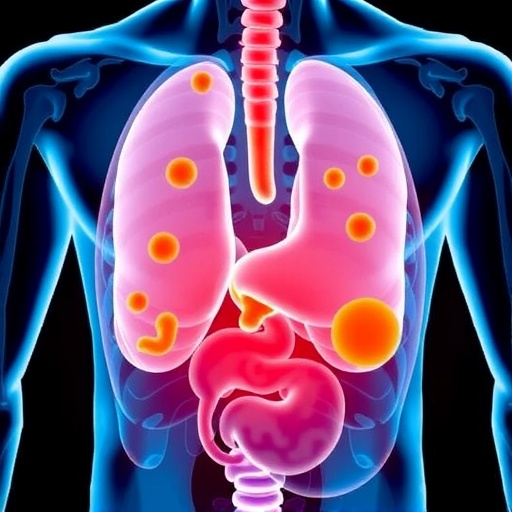In the relentless battle against prostate cancer, a beacon of hope emerges from the ancient spice turmeric. A newly published systematic review in BMC Cancer meticulously dissects the molecular intricacies of curcumin—a potent polyphenol extracted from Curcuma longa—demonstrating its multi-faceted anti-cancer effects. Despite prostate cancer’s notorious resistance to conventional treatments, curcumin’s ability to modulate crucial cellular pathways reveals promising avenues for novel therapies.
Prostate cancer remains one of the most common malignancies in men worldwide, frequently evolving into castration-resistant forms that defy standard hormone-based interventions. Researchers have long searched for agents capable of circumventing these resistance mechanisms. Curcumin’s therapeutic potential has garnered attention for its diverse molecular actions, but challenges persist in translating preclinical success into clinical efficacy due to its poor bioavailability.
This comprehensive review synthesizes 22 recent preclinical studies investigating curcumin’s molecular targets within prostate cancer models. Among the cardinal pathways influenced by curcumin are the PI3K/Akt/mTOR cascade, which regulates cell survival and metabolism, and the NF-κB signaling axis, a master regulator of inflammation and tumor progression. Additionally, curcumin modulates androgen receptor (AR) signaling, a critical driver of prostate tumor growth, thereby targeting the disease at multiple control nodes.
At the heart of curcumin’s anti-cancer arsenal lies its ability to induce apoptosis and necroptosis—programmed and inflammatory programmed cell death modalities, respectively. These processes effectively disrupt cancer cell proliferation and survival. Moreover, the compound enforces cell cycle arrest, preventing unchecked cellular division, while simultaneously suppressing cancer cell migration and angiogenesis, thereby stifling the cancer’s invasive and metastatic capabilities.
One of the formidable obstacles in realizing curcumin’s full therapeutic potential is its inherently poor pharmacokinetics. The compound’s low solubility and rapid metabolism curtail its bioavailability in systemic circulation, limiting the doses achievable within tumors. Overcoming these barriers has become a pivotal focus in curcumin research.
Innovative nanoformulation techniques have surged forward, revolutionizing curcumin delivery. The review highlights various nano-carriers such as Theracurmin®, a nanoparticle-based formulation that enhances systemic absorption, and PLGA-curcumin, which facilitates targeted delivery and sustained release within tumor microenvironments. These engineered nanosystems not only increase curcumin’s bioavailability but also ensure preferential accumulation inside malignant tissues, minimizing off-target effects.
Combining curcumin with established chemotherapeutic agents emerges as a synergistic strategy to potentiate anti-cancer efficacy. Specifically, co-administration with docetaxel—standard frontline chemotherapy for advanced prostate cancer—amplifies apoptosis induction and overcomes drug resistance mechanisms. Similarly, integration with natural compounds like quercetin or adjunct treatments such as phototherapy has demonstrated enhanced tumor suppression in preclinical models.
Despite these encouraging findings, a gap remains between bench and bedside. Clinical translation lags due to the complexity of prostate cancer biology, variations in curcumin formulations, and lack of large-scale clinical trials assessing optimized delivery systems. The review strongly advocates for rigorously designed clinical studies that incorporate advanced nanoformulations and combination regimens within well-characterized patient populations.
At the molecular level, curcumin acts as a pleiotropic agent. It simultaneously orchestrates downregulation of oncogenic signaling, dampens pro-inflammatory cytokines, and reinstates apoptotic pathways that cancer cells often evade. This multi-targeted mode of action positions curcumin as a powerful adjuvant capable of enhancing current therapeutic landscapes while potentially mitigating side effects.
The transition into nanomedicine represents a paradigm shift. By engineering curcumin into nanoparticles, liposomes, or polymeric micelles, researchers surmount solubility and stability issues, rendering the compound more bioavailable and pharmacodynamically potent. These breakthroughs herald a new era for natural product-based drug development.
Emerging data also underscore the importance of the tumor microenvironment in prostate cancer progression and therapy resistance. Curcumin’s ability to modulate angiogenesis disrupts the vascular support tumors depend upon, while its anti-migratory effects impede metastasis—a chief cause of mortality in advanced stages.
Moreover, curcumin’s impact on androgen receptor signaling reverberates profoundly given that AR drives prostate cancer pathogenesis. By inhibiting AR transcriptional activity, curcumin targets the disease’s hormonal underpinnings, offering an alternative or complementary pathway to traditional androgen deprivation therapies.
Encouragingly, the combination of curcumin with modern phototherapy harnesses oxidative stress mechanisms, selectively killing cancer cells while sparing normal tissues. This synergy paves the way for multimodal treatment regimens that could redefine the management of refractory prostate cancer.
While the preclinical landscape is rich with promise, the review cautions that therapeutic success hinges on meticulous clinical validation. Advanced nanoformulations must be evaluated in controlled trials to confirm safety, optimize dosage, and establish definitive clinical benefit. Only then can curcumin’s multifaceted potential be fully harnessed for patient care.
In summary, this systematic assessment conveys a compelling narrative: curcumin, historically valued for its medicinal properties, stands at the forefront of innovative prostate cancer therapies. Its ability to concurrently intercept multiple oncogenic pathways, combined with nanotechnology-driven delivery advancements, offers a beacon of hope against a tenacious disease. Future clinical endeavors will ultimately determine whether this golden spice can transform the therapeutic horizon for prostate cancer patients.
Subject of Research: Molecular mechanisms and nanoformulated delivery strategies of curcumin in prostate cancer treatment.
Article Title: Curcumin in prostate cancer: a systematic review of molecular mechanisms and nanoformulated therapeutic strategies
Article References:
Esmaeli, M., Dehghanpour Dehabadi, M. Curcumin in prostate cancer: a systematic review of molecular mechanisms and nanoformulated therapeutic strategies. BMC Cancer 25, 1609 (2025). https://doi.org/10.1186/s12885-025-15152-2
Image Credits: Scienmag.com
DOI: https://doi.org/10.1186/s12885-025-15152-2
Tags: alternative therapies for prostate cancerandrogen receptor signaling modulationanti-cancer effects of curcumincastration-resistant prostate cancerCurcumin and prostate cancer therapycurcumin bioavailability challengescurcumin’s therapeutic potential in oncologymolecular targets of curcuminNF-κB signaling in prostate cancerPI3K/Akt/mTOR pathway in cancerpreclinical studies on curcuminturmeric extract in cancer treatment





